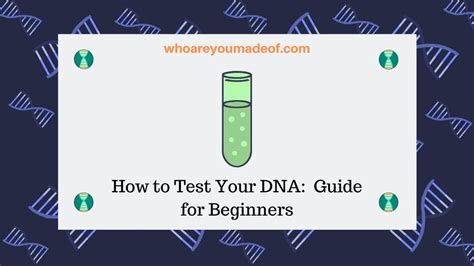DNA Testing for Beginners: A Home Guide
DNA testing has exploded in popularity, offering insights into ancestry, health predispositions, and even personality traits. But with so many options available, navigating the world of at-home DNA kits can feel overwhelming. This beginner's guide will demystify the process, helping you understand what's involved, what to expect, and how to choose the right test for your needs.
What is DNA Testing?
DNA testing analyzes your deoxyribonucleic acid – the building blocks of your genetic code. At-home tests typically involve providing a saliva sample, which is then sent to a laboratory for analysis. Sophisticated technology examines specific markers in your DNA, providing information based on the test you've chosen. This information can range from tracing your family tree across generations to identifying potential genetic health risks.
Types of DNA Tests Available
Several types of DNA tests cater to different interests:
Ancestry DNA Tests:
These tests focus on tracing your ethnic origins and identifying potential relatives. They analyze specific markers in your DNA to determine your percentage of ancestry from different regions of the world. Some services even connect you with potential living relatives who have also taken the test.
Health & Wellness DNA Tests:
These tests examine specific genes associated with various health conditions. They can assess your risk for developing certain diseases, your response to medications, and even your nutritional needs. Important Note: These tests should not be interpreted as definitive diagnoses. Always consult with a healthcare professional to discuss your results and their implications.
Trait & Personality DNA Tests:
While less scientifically robust than ancestry and health tests, these tests explore genetic influences on personality traits, physical characteristics, and even predispositions to certain behaviors. The accuracy and interpretation of these tests should be approached with caution.
Choosing the Right DNA Test
Selecting the right DNA test depends on your goals:
- Ancestry: If you're interested in learning about your family history and ethnic origins, an ancestry DNA test is the best choice.
- Health: If you want to understand your genetic predispositions to certain diseases, a health and wellness test is appropriate, but remember to consult a doctor to interpret the results.
- Traits: If you're curious about genetic influences on personality or physical traits, a trait and personality test can be interesting, but be mindful of the limitations of these tests.
How to Take a Home DNA Test
Most at-home DNA tests follow a similar process:
- Order a kit: Choose a reputable company and order the test online.
- Collect your sample: Follow the instructions carefully. This usually involves spitting into a collection tube or swabbing your cheek.
- Mail your sample: Use the pre-paid packaging provided to send your sample to the lab.
- Receive your results: This typically takes several weeks, depending on the company and the type of test.
- Review your results: Most companies provide an online portal to access and understand your results.
What to Expect from Your Results
The information you receive will vary depending on the type of test you chose. Ancestry tests provide details on your ethnic background and potential relatives. Health tests highlight genetic predispositions, but not definitive diagnoses. Trait tests offer insights into potential genetic influences on various aspects of your personality and physical traits.
Understanding the Limitations of DNA Testing
It's crucial to understand the limitations:
- Not a definitive diagnosis: Health-related DNA tests only assess risk; they do not diagnose diseases.
- Incomplete picture: DNA tests only reveal a portion of your genetic makeup, and environmental factors significantly influence health and traits.
- Privacy concerns: Be aware of the company's privacy policy and how your data is handled.
What are the different types of DNA testing available?
This question is answered in the "Types of DNA Tests Available" section above.
How accurate are at-home DNA tests?
The accuracy of at-home DNA tests varies depending on the type of test and the company. Ancestry tests are generally quite accurate in determining broad ethnic origins. However, the accuracy of health and trait tests can be more variable, depending on the specific genes being analyzed and the complexity of the trait. It's crucial to choose a reputable company with established testing methodologies.
Are at-home DNA tests safe?
Reputable at-home DNA testing companies generally adhere to strict privacy and safety protocols. However, it's essential to read the company's privacy policy carefully before providing your sample.
How much do at-home DNA tests cost?
The cost of at-home DNA tests varies widely depending on the type of test and the company. Prices can range from a few hundred dollars to well over a thousand dollars for comprehensive health tests.
Conclusion
At-home DNA testing offers a fascinating glimpse into your genetic heritage and potential health predispositions. By understanding the different types of tests available, the process involved, and the limitations of the technology, you can make an informed decision about whether DNA testing is right for you and choose the test that best meets your needs. Remember to always consult a healthcare professional for personalized advice and interpretation of any health-related results.

